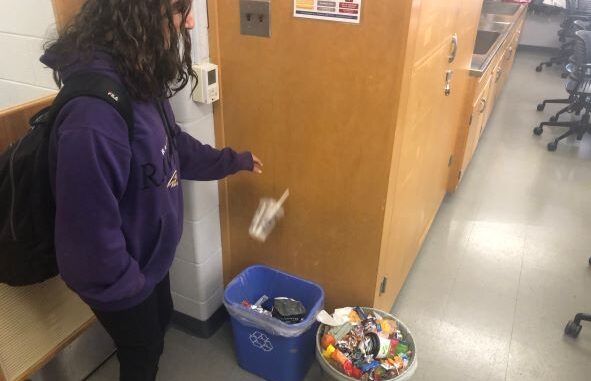
By Rachel Sell//
Hood’s recycling efforts fall far too short of the sustainability that is needed now more than ever, despite the progress made in its composting program.
As an institution, Hood should be doing more to strengthen its recycling efforts and to provide information to students about which materials can be recycled and which cannot.
A recent study conducted on campus by Sustaining Hood President Gabby Diaz indicated that a significant number of non-recyclables find their way into recycling bins.
Even if Hood provided recycling information to students, there’s no telling how many would take advantage of it. One of the largest barriers to recycling is the doubt of its effectiveness because no one really knows what happens to the recycling gathered at Hood.
According to Diaz, collecting recycling is under the jurisdiction of the custodial staff at Hood. If there are materials in the recycling bins that are not recyclable, the entire bin is thrown in with the trash.
“The recycling we do, on a very small level, never even makes it there… it’s all just labeled trash,” Diaz said.
During her research, Diaz was told that recycling didn’t even make it onto campus facilities’ list, given all the other things they manage daily.
“A lot of schools have waste management positions,” Diaz said. “We need somebody [whose] whole job is to manage the waste here, to take that responsibility off of the facilities department.”
On a larger scale, the effectiveness of recycling is also doubted because many materials that are widely believed to be recyclable are not.
“Plastics are the most complicated thing to recycle by far,” Frederick County Landfill Recycling Program Manager Rebecca Culler said.
Culler explained that many plastics end up going into the trash at the end of their journey anyway due to the resin type they’re made from, as well as what materials and additives are mixed in.
To further understand the significance of recycling at a local level, people need to understand the other end of the spectrum, the issue of waste.
According to the EPA, the current estimate of waste generated per person is nine pounds a day, including everything from food waste to recyclable material.
At the Frederick County Landfill, where Culler has worked for seven years, trash is only added to the landfill for two weeks out of every year. For the other 50 weeks, the facility sends out 50 to 55 trash trucks a day, each carrying 13 to 14 tons, to Pennsylvania.
“We want [our site] to last until at least 2045,” Culler said. “No one in Frederick County is ever going to want another landfill built here, ever.”
The landfill also deals with compost, but there are limitations. Culler encouraged students to compost food waste on a small scale.
Unlike recycling at Hood, composting endeavors at our college have been largely successful. In partnership with Key City Compost, the food waste gathered in compost bins in the dining hall, generated by students and through the food prep in the kitchen, is utilized for compost instead of forfeited as waste.
Even though the composting bin has only been around for two semesters, it has already shown great promise. Additionally, the compost collection isn’t terribly expensive. “It’s not a huge number, but there is a cost associated with it,” Director of Dining Services John Bragel said.
If Hood could use the compost program as an example of how to properly dispose of waste, it could seek better results for its recycling system.
One of the reasons that the composting program has had success is because it has the school’s support behind it.
There is no department or administrator that is truly responsible for recycling at Hood, but in today’s world, there is no excuse for institutions to ignore the issue of waste, especially when campuses generate so much of it.
##




Be the first to comment